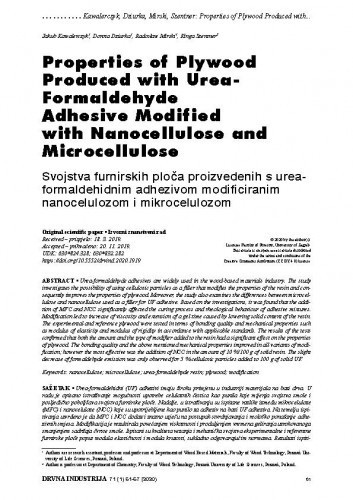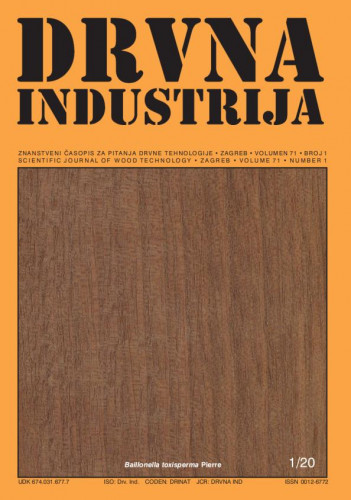Urea-formaldehyde adhesives are widely used in the wood-based materials industry. The study investigates the possibility of using cellulosic particles as a filler that modifies the properties of the resin and consequently improves the properties of plywood. Moreover, the study also examines the differences between microcellulose and nanocellulose used as a filler for UF adhesive. Based on the investigations, it was found that the addition of MFC and NCC significantly affected the curing process and rheological behaviour of adhesive mixtures. Modification led to increase of viscosity and extension of a gel time caused by lowering solid content of the resin. The experimental and reference plywood were tested in terms of bonding quality and mechanical properties such as modulus of elasticity and modulus of rigidity in accordance with applicable standards. The results of the tests confirmed that both the amount and the type of modifier added to the resin had a significant effect on the properties of plywood. The bonding quality and the above mentioned mechanical properties improved in all variants of modification; however the most effective was the addition of NCC in the amount of 10 %/100 g of solid resin. The slight decrease of formaldehyde emission was only observed for 5 % cellulosic particles added to 100 g of solid UF.; Urea-formaldehidni (UF) adhezivi imaju široku primjenu u industriji materijala na bazi drva. U radu je opisano istraživanje mogućnosti upotrebe celuloznih čestica kao punila koje mijenja svojstva smole i posljedično poboljšava svojstva furnirske ploče. Nadalje, u istraživanju su ispitane razlike između mikroceluloze (MFC) i nanoceluloze (NCC) koje su upotrijebljene kao punilo za adheziv na bazi UF adheziva. Na temelju ispitivanja utvrđeno je da MFC i NCC dodatci znatno utječu na postupak stvrdnjavanja i reološko ponašanje adhezivnih smjesa. Modifikacija je rezultirala povećanjem viskoznosti i produljenjem vremena geliranja uzrokovanoga smanjenjem sadržaja čvrste smole. Ispitani su kvaliteta vezanja i mehanička svojstva eksperimentalne i referentne furnirske ploče poput modula elastičnosti i modula krutosti, sukladno odgovarajućim normama. Rezultati ispitivanja potvrdili su da i količina i vrsta modifikatora dodanoga u smolu imaju znatan utjecaj na svojstva furnirske ploče. Kvaliteta vezanja i spomenuta mehanička svojstva poboljšana su pri svim varijantama modifikacija, no najučinkovitije je bilo dodavanje NCC-a u količini od 10 % na 100 g čvrste smole. Blago smanjenje emisije formaldehida uočeno je samo za 5 % celuloznih čestica dodanih u 100 g čvrstog UF adheziva.
Sažetak

 Drvna industrija : znanstveni časopis za pitanja drvne tehnologije : 71,1(2020) / glavni i odgovorni urednik Ružica Beljo-Lučić.
Drvna industrija : znanstveni časopis za pitanja drvne tehnologije : 71,1(2020) / glavni i odgovorni urednik Ružica Beljo-Lučić.